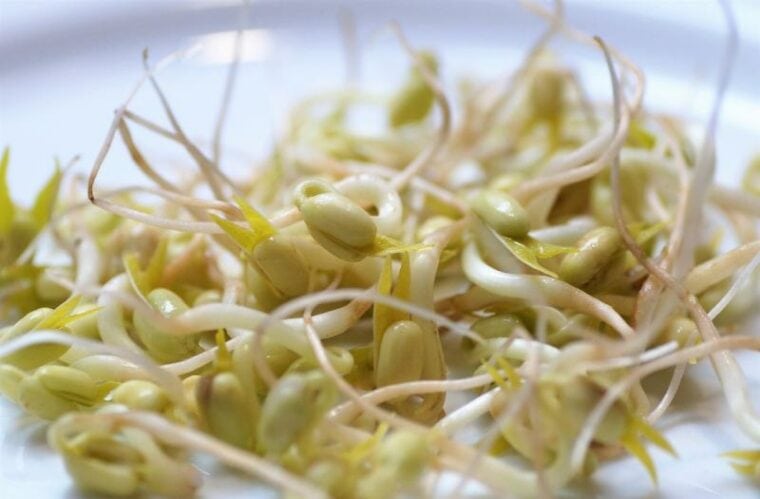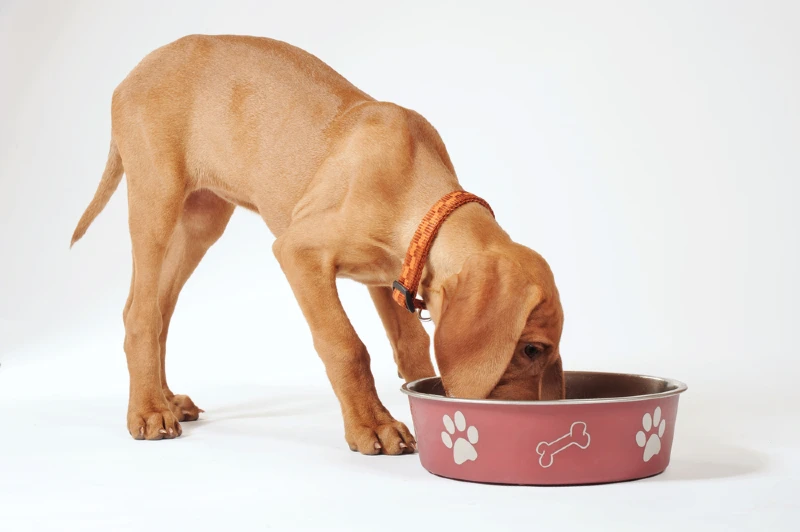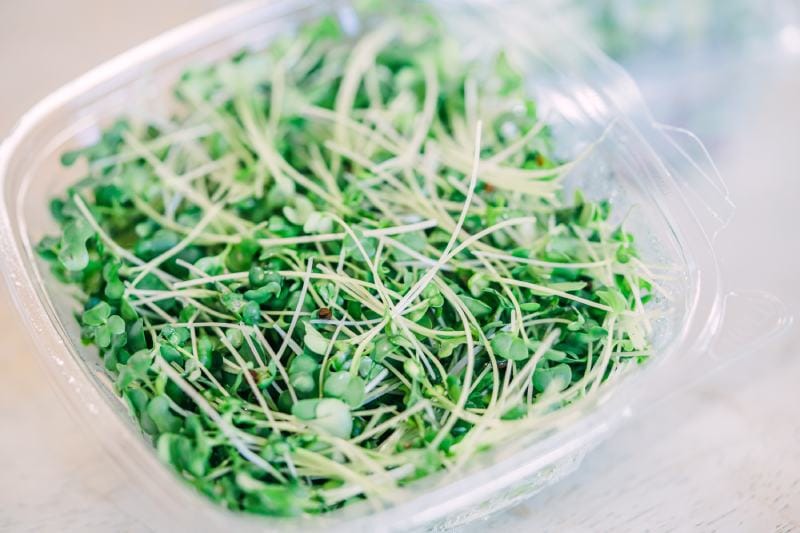[ad_1]

Bean sprouts make a great, crunchy topper for sandwiches or ramen, but can you share this healthy vegetable with the pet giving you the puppy dog eyes as you chow down on your meal?
Yes, bean sprouts are generally safe for dogs to eat. They contain several nutrients that can benefit your dog, but there are some things to consider before offering them to your pet. Read on to learn more.

What Are Bean Sprouts?
The two most common types of sprouts are mung bean sprouts and alfalfa.
Bean sprouts are a vegetable grown by sprouting beans. Mung bean sprouts have round yellow heads and are often found in Asian or Southeast Asian dishes like ramen or stir-fries.
Alfalfa sprouts do not come from beans, but because they’re a type of sprout and often get confused with bean sprouts, we’ll be looking at them briefly today, too. They are flowering heirloom legume plants with wispy threads commonly used as toppers for salads and sandwiches.
Can Dogs Eat Bean Sprouts?
Yes, your dog can eat bean sprouts. They contain many nutrients that can benefit your pup.
According to WebMD, the nutritional information for bean sprouts is as follows:
| Calories | 16 calories |
| Fat | 0 grams |
| Carbohydrates | 3 grams |
| Dietary Fiber | 1 gram |
| Protein | 2 grams |
| Sugar | 2 grams |
Sprouts contain vitamins and minerals like vitamin C, calcium, manganese, and iron.
Vitamin C is an important antioxidant for dogs and humans alike. It can help reduce inflammation and signs of cognitive aging. While dogs can meet their nutritional needs for vitamin C through glucose metabolism in their diet, some research suggests that the antioxidant properties of supplementation can help manage certain medical conditions, like cancer, dementia, and heart disease.

Calcium is an important component of a dog’s diet as it is involved in blood coagulation and nerve impulse transmission. Most commercial dog diets provide adequate amounts of calcium, but some homemade diets may be deficient in this nutrient.
Manganese is a trace mineral that your dog needs in small amounts. It’s necessary to produce energy, metabolize protein and carbohydrates, and produce fatty acids. It even plays a role in the health and maintenance of your dog’s bones and joint cartilage.
Iron is an essential part of a balanced diet for red blood cell production. Inadequate dietary iron intake is not common in dogs fed a commercial pet food diet but can occur in pets fed a home-cooked diet.
Mung bean sprouts are also a great plant-based protein source. They are high in amino acids like leucine and lysine, which your dog needs to build and maintain muscles, bones, organs, and skin.
In addition, both mung bean and alfalfa sprouts contain isoflavones. Isoflavones have antioxidant properties that can decrease tissue damage in normal cell metabolism. Some research even suggests that dogs fed a diet high in isoflavones may see a reduction in body fat.
While bean sprouts are a decent source of the above vitamins and minerals, they should not be the main component of your dog’s diet. You shouldn’t rely on bean sprouts to supply your dog with the nutrients it needs.
Are All Sprouts Safe?
There is some conflicting information on the internet regarding sprouts and dogs. Most sources give the green light, but there are some things to know before serving it to your pup.
Alfalfa sprouts contain coumarin and vitamin K, making it an effective anti-coagulant. Dog owners must exercise caution if offering them to their pets with anemia. In addition, its saponin content can make fresh alfalfa a gastrointestinal nightmare for dogs, producing nausea and gastritis.
Alfalfa sprouts also contain phytoestrogens, which can be troublesome in dogs with endocrine system issues.
Both sprouts are high in fiber, which can cause excess gas in some dogs.

How Can I Serve Bean Sprouts?
If your dog has taken a liking to bean sprouts, you can serve them in several ways.
Chop them and add them as an ingredient in your dog’s home-cooked meals or use them as a topper on its kibble.
It’s best to serve sprouts cooked as they contain saponins, which can cause issues with how your dog’s body absorbs nutrients. In addition, sprouts are typically grown in a moist environment that may be a perfect breeding ground for bacteria. Bean sprouts have also been found to be contaminated with parasites too. Cooking them will minimize the chances of your pup encountering any such nasties.
Cooking sprouts is easy and quick. Steaming or boiling is the best way, as sautéing or frying requires oil which is fatty.
Dogs can eat raw sprouts but be wary when serving them this way. The freshest sprouts will make a clear snapping sound when broken. Compost any slimy or discolored sprouts. Remember that they spoil quickly, so putting them in the fridge will help extend their lifespan.
As with any human food, do not add seasonings to sprouts meant for your dog.

Final Thoughts
While bean sprouts shouldn’t make up a huge portion of your dog’s diet, offering your sprout-loving canine family member some occasionally is okay. Moderation is key here, as too many can cause gassiness or digestive upset due to their high fiber content.
Featured Image Credit: ivabalk, Pixabay

